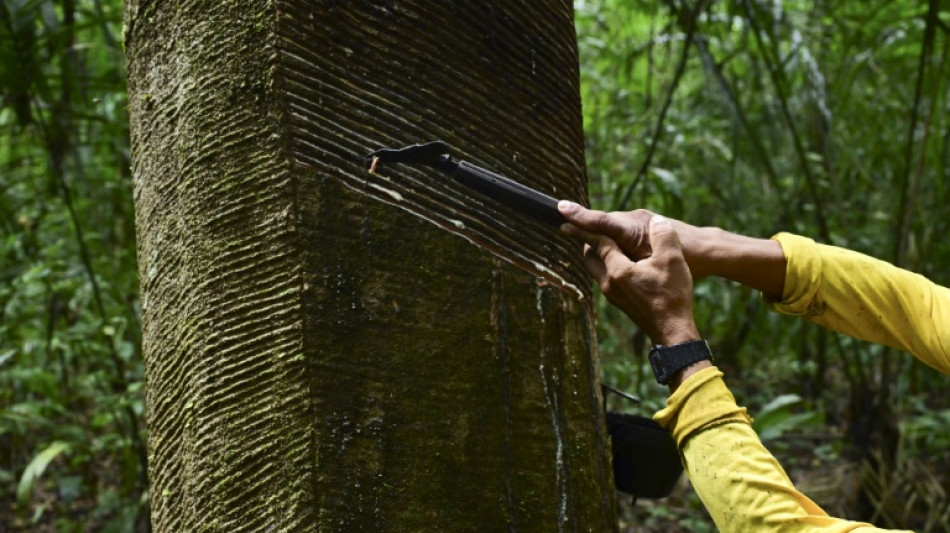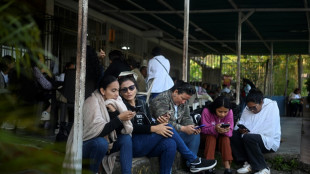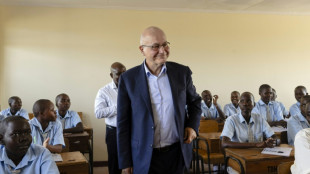
-
 Scientists reveal what drives homosexual behaviour in primates
Scientists reveal what drives homosexual behaviour in primates
-
Venezuela releases more political prisoners as pressure builds

-
 15,000 NY nurses stage largest-ever strike over conditions
15,000 NY nurses stage largest-ever strike over conditions
-
Rosenior plots long Chelsea stay as Arsenal loom

-
 Zuckerberg names banker, ex-Trump advisor as Meta president
Zuckerberg names banker, ex-Trump advisor as Meta president
-
Reza Pahlavi: Iran's ex-crown prince dreaming of homecoming

-
 Venezuela releases more political prisoners
Venezuela releases more political prisoners
-
Kenya's NY marathon champ Albert Korir gets drug suspension

-
 US prosecutors open probe of Fed chief, escalating Trump-Powell clash
US prosecutors open probe of Fed chief, escalating Trump-Powell clash
-
Russian captain in fiery North Sea crash faces UK trial

-
 Carrick is frontrunner for interim Man Utd job: reports
Carrick is frontrunner for interim Man Utd job: reports
-
Iran government stages mass rallies as alarm grows over protest toll

-
 Variawa leads South African charge over Dakar dunes
Variawa leads South African charge over Dakar dunes
-
Swiss inferno bar owner detained for three months

-
 Heathrow airport sees record high annual passenger numbers
Heathrow airport sees record high annual passenger numbers
-
Georgia jails ex-PM for five years amid ruling party oustings

-
 Kyiv buries medic killed in Russian drone strike
Kyiv buries medic killed in Russian drone strike
-
Israel revokes French researcher's travel permit

-
 India and Germany seek to boost defence industry ties
India and Germany seek to boost defence industry ties
-
French coach and football pundit Rolland Courbis dies at 72

-
 UK regulator opens probe into X over sexualised AI imagery
UK regulator opens probe into X over sexualised AI imagery
-
AFCON organisers investigate incidents after Algeria-Nigeria clash

-
 US Fed chief warns of 'intimidation' after criminal subpoenas
US Fed chief warns of 'intimidation' after criminal subpoenas
-
Gold hits record high, dollar falls as US targets Fed

-
 Iran says 'prepared for war' as alarm grows over protest toll
Iran says 'prepared for war' as alarm grows over protest toll
-
India and Germany eye defence industry boost to ties

-
 'I know the pain': ex-refugee takes over as UNHCR chief
'I know the pain': ex-refugee takes over as UNHCR chief
-
US prosecutors open criminal probe into Federal Reserve

-
 Rohingya 'targeted for destruction' by Myanmar, ICJ hears
Rohingya 'targeted for destruction' by Myanmar, ICJ hears
-
'Genius' chimpanzee Ai dies in Japan at 49

-
 Trump says US will take Greenland 'one way or the other'
Trump says US will take Greenland 'one way or the other'
-
Asian equities, precious metals surge as US Justice Dept targets Fed

-
 Myanmar pro-military party claims Suu Kyi's seat in junta-run poll
Myanmar pro-military party claims Suu Kyi's seat in junta-run poll
-
Fed chair Powell says targeted by federal probe

-
 Trailblazing Milos Raonic retires from tennis
Trailblazing Milos Raonic retires from tennis
-
Australia recalls parliament early to pass hate speech, gun laws

-
 'One Battle After Another,' 'Hamnet' triumph at Golden Globes
'One Battle After Another,' 'Hamnet' triumph at Golden Globes
-
Japan aims to dig deep-sea rare earths to reduce China dependence

-
 Top UN court to hear Rohingya genocide case against Myanmar
Top UN court to hear Rohingya genocide case against Myanmar
-
US sends more agents to Minneapolis despite furor over woman's killing

-
 Trump says Iran 'want to negotiate' after reports of hundreds killed in protests
Trump says Iran 'want to negotiate' after reports of hundreds killed in protests
-
Bangladesh's powerful Islamists prepare for elections

-
 NBA-best Thunder beat the Heat as T-Wolves edge Spurs
NBA-best Thunder beat the Heat as T-Wolves edge Spurs
-
Ukraine's Kostyuk defends 'conscious choice' to speak out about war

-
 Trump says working well with Venezuela's new leaders, open to meeting
Trump says working well with Venezuela's new leaders, open to meeting
-
Asian equities edge up, dollar slides as US Fed Reserve subpoenaed

-
 Hong Kong court hears sentencing arguments for Jimmy Lai
Hong Kong court hears sentencing arguments for Jimmy Lai
-
Powell says Federal Reserve subpoenaed by US Justice Department

-
 Chalamet, 'One Battle' among winners at Golden Globes
Chalamet, 'One Battle' among winners at Golden Globes
-
Turning point? Canada's tumultuous relationship with China


Rubber tappers forge sustainable future in Amazon
As the sun rises over the Amazonian island of Marajo, Renato Cordeiro laces up his boots, grabs his knife, and heads out to tap his rubber trees.
Drop by drop, he collects the milky white sap, known as latex, that sustains him.
The recent revival of the rubber tapper trade in this impoverished northern Brazilian region has created jobs for families who once thrived during the Amazonian rubber boom, which collapsed in the late 20th century.
A local company called Seringo has enabled Cordeiro and more than 1,500 other rubber tappers to resume their craft. The company produces goods such as footwear while also protecting the forest, increasingly threatened by deforestation.
For Cordeiro, a wiry 57-year-old, the Amazon is his backyard.
Behind his stilt house on the Anajas River, dozens of natural rubber trees blend with centuries-old trees and palms typical of this island, surrounded by rivers on one side and the sea on the other.
- 'Family heritage' -
"I started tapping trees at age seven with my mother, deep in the forest," said Cordeiro, holding his knife, which has a protruding metal piece for making precise cuts in the bark.
With each incision made carefully to avoid harming the trunk, the native Amazonian tree begins to drip its latex into a container placed underneath. As it fills, Renato moves on to the next tree.
Each day, he collects about 18 liters (4.8 gallons), mixing it with vinegar to produce white rubber sheets. These hang on a rope for 10 days to dry before being sold to Seringo, which picks them up from his riverside home.
Cordeiro, a married father of three, beams with pride. After nearly two decades of scraping by through hunting and acai harvesting, he returned to rubber tapping in 2017 to protect what he calls his family heritage — the forest.
"I longed for this work to return," says Valcir Rodrigues, another rubber tapper and father of five, from a stilt house along the river north of Anajas.
"We want to leave a better world for our children, so we don't deforest," he says.
Rodrigues frequently confronts loggers who invade his land to cut down trees.
"They need to understand how much they harm the forest — and themselves — since many end up in debt to their employers," he explains.
Deforestation surged in Marajo when global demand for Amazonian rubber plummeted as countries like Malaysia began large-scale rubber tree plantations.
Today, however, rubber sustains Rodrigues's entire family. His wife and mother-in-law skillfully craft colorful artisanal goods sold primarily in Belem, the capital of Para state, to Marajo's east.
"I was a civil servant, but the local government never gave me a job. This is my first real trade, and I love it," said his mother-in-law Vanda Lima, a smiling 60-year-old.
- Expansion -
With one of Brazil's worst Human Development Index rankings, "it was necessary to create income in Marajo," says Zelia Damasceno, who co-founded Seringo with her husband to boost the region's bio-economy.
Initially focused on promoting artisanal work, the couple realized that rubber tappers were "unsatisfied," extracting latex sporadically for their spouses to use in making crafts.
"That's why we envisioned a second purpose — footwear — so they could also earn a living," says Damasceno, 59, from Para.
At its factory in Castanhal, about 300 kilometers (200 miles) east of Marajo, Seringo produces 200 pairs of biodegradable shoes daily, made from 70 percent rubber and 30 percent acai powder.
The company recently received support from the Para government to expand the number of rubber tappers it calls on in Marajo to 10,000.
That is part of a sustainable development program launched ahead of COP30, a UN climate conference scheduled for November in Belem.
Still, challenges remain, Damasceno admits: "Some young people don't want to follow this path. We must raise awareness about the importance of this work to preserve the forest and their future."
W.AbuLaban--SF-PST



